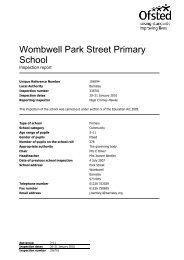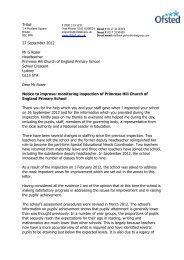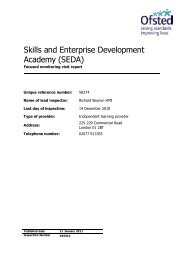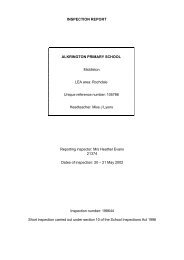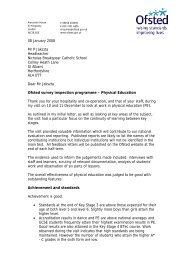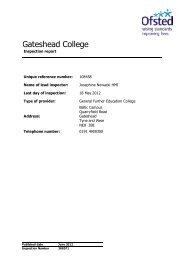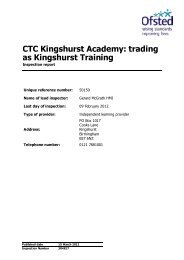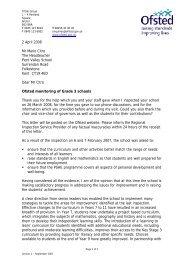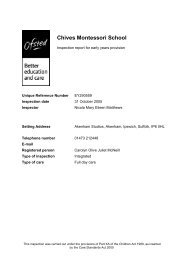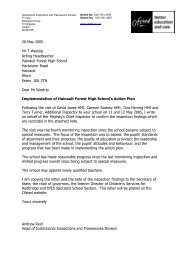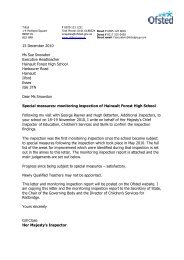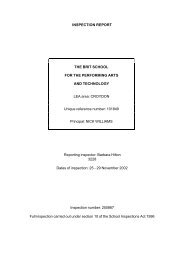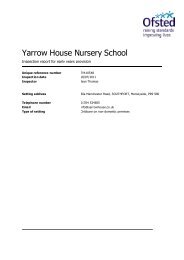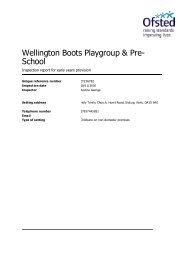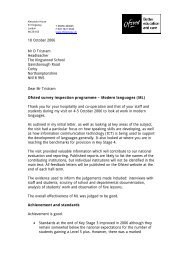Maun Infant and Nursery School - Ofsted
Maun Infant and Nursery School - Ofsted
Maun Infant and Nursery School - Ofsted
You also want an ePaper? Increase the reach of your titles
YUMPU automatically turns print PDFs into web optimized ePapers that Google loves.
Unique Reference Number<br />
LEA<br />
Inspection number<br />
Inspection dates<br />
Reporting inspector<br />
<strong>Maun</strong> <strong>Infant</strong> <strong>and</strong> <strong>Nursery</strong><br />
<strong>School</strong><br />
Inspection Report<br />
122667<br />
NOTTINGHAMSHIRE LEA<br />
281320<br />
6 July 2006 to 7 July 2006<br />
Mr. Michael Best AI<br />
This inspection was carried out under section 5 of the Education Act 2005.<br />
Type of school<br />
<strong>School</strong> category<br />
Age range of pupils<br />
Gender of pupils<br />
Number on roll<br />
Appropriate authority<br />
Date of previous inspection<br />
Age group<br />
3 to 7<br />
Inspection dates<br />
6 July 2006 -<br />
7 July 2006<br />
Primary<br />
Community<br />
3 to 7<br />
Mixed<br />
217<br />
The governing body<br />
4 October 1999<br />
Inspection number<br />
281320<br />
<strong>School</strong> address<br />
Telephone number<br />
Fax number<br />
Chair of governors<br />
Headteacher<br />
Walesby Lane<br />
NG22 9RJ<br />
01623 860773<br />
01623 862075<br />
Mr.Tom McLafferty<br />
Mrs. Mary Haig
Inspection Report: <strong>Maun</strong> <strong>Infant</strong> <strong>and</strong> <strong>Nursery</strong> <strong>School</strong>, 6 July 2006 to 7 July 2006<br />
© Crown copyright 2006<br />
Website: www.ofsted.gov.uk<br />
This document may be reproduced in whole or in part for non-commercial educational purposes, provided that<br />
the information quoted is reproduced without adaptation <strong>and</strong> the source <strong>and</strong> date of publication are stated.<br />
Further copies of this report are obtainable from the school. Under the Education Act 2005, the school must<br />
provide a copy of this report free of charge to certain categories of people. A charge not exceeding the full cost<br />
of reproduction may be made for any other copies supplied.
Inspection Report: <strong>Maun</strong> <strong>Infant</strong> <strong>and</strong> <strong>Nursery</strong> <strong>School</strong>, 6 July 2006 to 7 July 2006<br />
Introduction<br />
The inspection was carried out by two Additional Inspectors.<br />
Description of the school<br />
The school is similar in size to other primary schools. Pupil mobility is below average.<br />
The proportion of pupils learning English as an additional language is below average.<br />
The attainment of pupils entering the Foundation Stage is below average. The<br />
proportion of pupils with learning difficulties or disabilities is above the national<br />
average, but very few have a statement outlining their needs.<br />
Key for inspection grades<br />
Grade 1<br />
Outst<strong>and</strong>ing<br />
Grade 2<br />
Good<br />
Grade 3<br />
Satisfactory<br />
Grade 4<br />
Inadequate<br />
1
Inspection Report: <strong>Maun</strong> <strong>Infant</strong> <strong>and</strong> <strong>Nursery</strong> <strong>School</strong>, 6 July 2006 to 7 July 2006<br />
Overall effectiveness of the school<br />
Grade: 2<br />
This is a good school that cares well for its pupils. Inspectors agree with the school's<br />
view of its effectiveness. Pupils' achievement is good. The quality of provision <strong>and</strong><br />
st<strong>and</strong>ards in the Foundation Stage are good. When they start in the <strong>Nursery</strong>, many<br />
children have limited skills <strong>and</strong> experiences, particularly in speaking <strong>and</strong> listening. At<br />
the end of Year 2, st<strong>and</strong>ards in reading, writing <strong>and</strong> mathematics are broadly average.<br />
Evidence clearly demonstrates that these pupils have made good progress through<br />
the school, many from very low starting points. Pupils' personal development is good,<br />
reflecting the school's effective provision for their care, support <strong>and</strong> guidance. Pupils<br />
are well prepared for the next stage of their education. However, the attendance of<br />
a small but significant number of pupils is not good enough, <strong>and</strong> the school's efforts<br />
have not sufficiently raised parents' underst<strong>and</strong>ing of the importance of their children's<br />
good attendance. The quality of teaching <strong>and</strong> learning is good. Expectations are high,<br />
lessons well prepared to meet pupils' needs, <strong>and</strong> working relationships strong. However,<br />
more can be done to foster pupils' independence in learning. The good quality<br />
curriculum is exciting <strong>and</strong> fun. The school is well led <strong>and</strong> managed. Priorities for<br />
improvement reflect a good evaluation of the school's strengths <strong>and</strong> shortcomings,<br />
<strong>and</strong> governors <strong>and</strong> the entire staff team actively support them. Improvement since<br />
the last inspection has been good <strong>and</strong> the school's capacity to further improve is also<br />
good. It provides good value for money.<br />
What the school should do to improve further<br />
- Continue to raise pupils' achievement by increasing the opportunities for them to<br />
work independently. - Improve attendance, particularly for the significant minority of<br />
pupils who are absent too often.<br />
Achievement <strong>and</strong> st<strong>and</strong>ards<br />
Grade: 2<br />
Although many are still working towards the early learning goals for children at the<br />
end of the Reception year by the time they move to Year 1, children in the Foundation<br />
Stage make good progress from low starting points, particularly in their language <strong>and</strong><br />
communication <strong>and</strong> personal <strong>and</strong> social skills. Results in the 2005 National Curriculum<br />
Key Stage 1 assessments were broadly average in reading <strong>and</strong> mathematics, <strong>and</strong> above<br />
average in writing. Over time, results in mathematics have been steady; results in<br />
reading have improved, <strong>and</strong> there have been significant improvements in writing,<br />
particularly for boys. St<strong>and</strong>ards in the current Year 2 are broadly average. In<br />
mathematics they are similar to the previous year but lower in reading <strong>and</strong> writing.<br />
This group includes a high proportion of pupils with learning difficulties or disabilities;<br />
when they started in the <strong>Nursery</strong>, many children's skills <strong>and</strong> experiences were well<br />
below the local authority average, particularly for the boys. Achievement is good. The<br />
school sets challenging targets for pupils to achieve by the end of Year 2 <strong>and</strong> carefully<br />
tracks their progress towards these. Comprehensive evidence, backed by local authority<br />
2
Inspection Report: <strong>Maun</strong> <strong>Infant</strong> <strong>and</strong> <strong>Nursery</strong> <strong>School</strong>, 6 July 2006 to 7 July 2006<br />
monitoring <strong>and</strong> analysis, clearly shows that pupils, including those with additional<br />
learning needs, make good progress as they move through the school.<br />
Personal development <strong>and</strong> well-being<br />
Grade: 2<br />
The school places a very strong emphasis on supporting pupils' personal development<br />
<strong>and</strong> well-being. It makes good provision for pupils' spiritual, moral, social <strong>and</strong> cultural<br />
development through a creative approach to the curriculum, <strong>and</strong> the school's high<br />
expectations of behaviour. Pupils enjoy school <strong>and</strong> develop good attitudes to learning<br />
because the school recognises <strong>and</strong> rewards their efforts. All adults act as very good<br />
role models <strong>and</strong> lessons <strong>and</strong> other activities are fun. Pupils behave well, <strong>and</strong> work <strong>and</strong><br />
play together harmoniously. The attendance of most pupils is satisfactory. However,<br />
the well below average attendance of a significant minority means that these pupils<br />
miss valuable opportunities to learn <strong>and</strong> develop their personal skills. Pupils have a<br />
good underst<strong>and</strong>ing of how eating a balanced diet <strong>and</strong> taking exercise will help them<br />
stay healthy. They know what to do to keep themselves safe, <strong>and</strong> support each other<br />
well. Pupils have good opportunities to take responsibility <strong>and</strong> contribute to the school<br />
<strong>and</strong> the wider community, for example, by acting as a school councillor or playground<br />
buddy. Pupils' good achievement in literacy <strong>and</strong> numeracy, <strong>and</strong> the confidence they<br />
develop, prepare them well for the next stage of their education <strong>and</strong> for later life.<br />
Quality of provision<br />
Teaching <strong>and</strong> learning<br />
Grade: 2<br />
Pupils rightly say that classrooms are exciting places in which to learn. Teaching <strong>and</strong><br />
learning are consistently good <strong>and</strong> some aspects have outst<strong>and</strong>ing features. Classroom<br />
assistants provide valuable support for pupils. Staff have a very good underst<strong>and</strong>ing<br />
of how young children learn <strong>and</strong> are effectively developing links between subjects <strong>and</strong><br />
areas of learning. Staff manage pupils well. Their expectations of pupils' work are high<br />
<strong>and</strong> well informed by comprehensive assessment information. Staff share <strong>and</strong> regularly<br />
refer to learning intentions at the start of <strong>and</strong> during lessons, <strong>and</strong>, in the closing<br />
session, invite pupils to comment on how well they have got on. Pupils have a good<br />
underst<strong>and</strong>ing of what they need to do to improve. In the <strong>Nursery</strong>, adults'<br />
encouragement for pupils to work independently is particularly successful. This practice<br />
is developing in other year groups but, occasionally, some staff give pupils too much<br />
direction in their learning. Assessment procedures are very rigorous <strong>and</strong> provide the<br />
school with precise <strong>and</strong> comprehensive information about each pupil's attainment <strong>and</strong><br />
progress. Reports to parents are detailed <strong>and</strong> include targets. Staff have detailed <strong>and</strong><br />
an accurate knowledge of what pupils know <strong>and</strong> can do. The use of this information<br />
to inform the next steps in pupils' learning is a strength.<br />
3
Inspection Report: <strong>Maun</strong> <strong>Infant</strong> <strong>and</strong> <strong>Nursery</strong> <strong>School</strong>, 6 July 2006 to 7 July 2006<br />
Curriculum <strong>and</strong> other activities<br />
Grade: 2<br />
The school provides a relevant <strong>and</strong> creative curriculum that pupils find stimulating<br />
<strong>and</strong> fun. Pupils say they really enjoy the good range of visits they go on <strong>and</strong> the clubs<br />
they attend because they help them learn. The range of activities provided is good<br />
<strong>and</strong> contributes very well to their social <strong>and</strong> cultural development, <strong>and</strong> to their health<br />
<strong>and</strong> well-being. Children in the <strong>Nursery</strong> have particularly good opportunities to develop<br />
their independence <strong>and</strong> make choices but this aspect of curriculum planning is still<br />
developing in other year groups. Good links are made between subjects. This gives<br />
pupils a purpose for their learning <strong>and</strong> provides them with the opportunity to practise<br />
basic skills, such as writing <strong>and</strong> using a computer. In lessons, pupils are encouraged<br />
to discuss their ideas <strong>and</strong> work together. This helps them to improve their speaking<br />
<strong>and</strong> listening skills, extend their vocabularies, <strong>and</strong> learn how to work effectively as a<br />
team.<br />
Care, guidance <strong>and</strong> support<br />
Grade: 2<br />
The school cares for pupils very well because procedures to ensure their health <strong>and</strong><br />
safety are robust, known by all staff <strong>and</strong> consistently implemented. Pupils feel safe<br />
<strong>and</strong> supported, <strong>and</strong> value the way their achievements are celebrated. Based on trust<br />
<strong>and</strong> mutual respect, relationships in the school are good. This helps pupils to feel<br />
special, <strong>and</strong> their self-esteem <strong>and</strong> confidence develop well. Detailed assessment<br />
procedures <strong>and</strong> the skills of the staff ensure that pupils are guided <strong>and</strong> supported well<br />
in all aspects of their development. Working closely with outside agencies <strong>and</strong> parents<br />
enables the school to provide all pupils with good support so that they achieve well.<br />
Productive links with other schools ensure that pupils transfer confidently to the next<br />
stage of their education. Teachers work very hard to ensure that all pupils make the<br />
progress of which they are capable. However, more could be done to make sure parents<br />
are fully aware of how their children's progress at school can be affected by their level<br />
of attendance.<br />
Leadership <strong>and</strong> management<br />
Grade: 2<br />
Leadership <strong>and</strong> management are good. The headteacher's strong leadership is<br />
successfully driving the school forward. Her clear <strong>and</strong> purposeful vision is well focused<br />
on pupils achieving the best they can in all aspects of their learning. She is supported<br />
by a hardworking <strong>and</strong> committed deputy headteacher <strong>and</strong> staff team, who are keen<br />
to take on responsibility <strong>and</strong> share good practice. Subject leaders are successfully<br />
developing their roles <strong>and</strong> effective monitoring of teaching, learning <strong>and</strong> st<strong>and</strong>ards is<br />
securing improvement. This is particularly evident in the development of pupils' writing,<br />
assessment procedures <strong>and</strong> the Foundation Stage curriculum. The provision for pupils<br />
with learning needs or disabilities is very well managed. The school has made good<br />
progress in resolving the issues identified in the last inspection report <strong>and</strong> has good<br />
4
Inspection Report: <strong>Maun</strong> <strong>Infant</strong> <strong>and</strong> <strong>Nursery</strong> <strong>School</strong>, 6 July 2006 to 7 July 2006<br />
capacity for further improvement. Through rigorous assessment <strong>and</strong> tracking<br />
procedures, the leadership sets challenging targets <strong>and</strong> clearly demonstrates the<br />
positive contribution of teaching <strong>and</strong> learning in pupils' good progress. Self-evaluation<br />
procedures are effective. The school has good regard for the views of all connected<br />
with it. Staff <strong>and</strong> governors actively promote the school's challenging but achievable<br />
priorities for development, <strong>and</strong> pupils <strong>and</strong> parents value improvements. Learning<br />
resources are of high quality, with good use made of interactive whiteboards. The<br />
well-maintained accommodation has been well adapted to meet current needs. Daily<br />
routines are well established <strong>and</strong> effectively managed. The governing body has a good<br />
underst<strong>and</strong>ing of the school's strengths <strong>and</strong> weaknesses because governors are closely<br />
involved in evaluating the school's work. The budget is wisely spent, with reserves<br />
within recommended levels.<br />
5
Inspection Report: <strong>Maun</strong> <strong>Infant</strong> <strong>and</strong> <strong>Nursery</strong> <strong>School</strong>, 6 July 2006 to 7 July 2006<br />
.<br />
Any complaints about the inspection or the report should be made following the procedures<br />
set out in the guidance 'Complaints about school inspection', which is available from <strong>Ofsted</strong>’s<br />
website: www.ofsted.gov.uk.<br />
6
Inspection judgements<br />
Key to judgements: grade 1 is outst<strong>and</strong>ing, grade 2 good, grade 3<br />
satisfactory, <strong>and</strong> grade 4 inadequate<br />
Overall effectiveness<br />
How effective, efficient <strong>and</strong> inclusive is the provision of education,<br />
integrated care <strong>and</strong> any extended services in meeting the needs of<br />
learners?<br />
How well does the school work in partnership with others to promote<br />
learners' well-being?<br />
The quality <strong>and</strong> st<strong>and</strong>ards in foundation stage<br />
The effectiveness of the school's self-evaluation<br />
The capacity to make any necessary improvements<br />
Effective steps have been taken to promote improvement since the last<br />
inspection<br />
Achievement <strong>and</strong> st<strong>and</strong>ards<br />
How well do learners achieve?<br />
The st<strong>and</strong>ards 1 reached by learners<br />
How well learners make progress, taking account of any significant variations<br />
between groups of learners<br />
How well learners with learning difficulties <strong>and</strong> disabilities make progress<br />
Personal development <strong>and</strong> well-being<br />
How good is the overall personal development <strong>and</strong> well-being of the<br />
learners?<br />
The extent of learners' spiritual, moral, social <strong>and</strong> cultural development<br />
The behaviour of learners<br />
The attendance of learners<br />
How well learners enjoy their education<br />
The extent to which learners adopt safe practices<br />
The extent to which learners adopt healthy lifestyles<br />
The extent to which learners make a positive contribution to the community<br />
How well learners develop workplace <strong>and</strong> other skills that will contribute to<br />
their future economic well-being<br />
The quality of provision<br />
How effective are teaching <strong>and</strong> learning in meeting the full range of<br />
the learners' needs?<br />
How well do the curriculum <strong>and</strong> other activities meet the range of<br />
needs <strong>and</strong> interests of learners?<br />
How well are learners cared for, guided <strong>and</strong> supported?<br />
<strong>School</strong><br />
Overall<br />
2<br />
2<br />
2<br />
2<br />
Yes<br />
Yes<br />
2<br />
3<br />
2<br />
2<br />
2<br />
2<br />
2<br />
3<br />
2<br />
2<br />
2<br />
2<br />
2<br />
2<br />
2<br />
2<br />
Annex A<br />
16-19<br />
1 Grade 1 - Exceptionally <strong>and</strong> consistently high; Grade 2 - Generally above average with none significantly below<br />
average; Grade 3 - Broadly average; Grade 4 - Exceptionally low.<br />
NA<br />
NA<br />
NA<br />
NA<br />
NA<br />
NA<br />
NA<br />
NA<br />
NA<br />
NA<br />
NA<br />
NA<br />
NA<br />
NA<br />
NA<br />
NA<br />
NA<br />
NA<br />
NA<br />
NA<br />
NA<br />
NA
Leadership <strong>and</strong> management<br />
How effective are leadership <strong>and</strong> management in raising achievement<br />
<strong>and</strong> supporting all learners?<br />
How effectively leaders <strong>and</strong> managers at all levels set clear direction leading<br />
to improvement <strong>and</strong> promote high quality of care <strong>and</strong> education<br />
How effectively performance is monitored, evaluated <strong>and</strong> improved to meet<br />
challenging targets, through quality assurance <strong>and</strong> self-review<br />
How well equality of opportunity is promoted <strong>and</strong> discrimination tackled so<br />
that all learners achieve as well as they can<br />
How effectively <strong>and</strong> efficiently resources are deployed to achieve value for<br />
money<br />
The extent to which governors <strong>and</strong> other supervisory boards discharge their<br />
responsibilities<br />
The adequacy <strong>and</strong> suitability of staff to ensure that learners are protected<br />
The extent to which schools enable learners to be healthy<br />
Learners are encouraged <strong>and</strong> enabled to eat <strong>and</strong> drink healthily<br />
Learners are encouraged <strong>and</strong> enabled to take regular exercise<br />
Learners are discouraged from smoking <strong>and</strong> substance abuse<br />
Learners are educated about sexual health<br />
The extent to which providers ensure that learners stay safe<br />
Procedures for safeguarding learners meet current government requirements<br />
Risk assessment procedures <strong>and</strong> related staff training are in place<br />
Action is taken to reduce anti-social behaviour, such as bullying <strong>and</strong> racism<br />
Learners are taught about key risks <strong>and</strong> how to deal with them<br />
The extent to which learners make a positive contribution<br />
Learners are helped to develop stable, positive relationships<br />
Learners, individually <strong>and</strong> collectively, participate in making decisions that affect them<br />
Learners are encouraged to initiate, participate in <strong>and</strong> manage activities in school <strong>and</strong> the<br />
wider community<br />
The extent to which schools enable learners to achieve economic well-being<br />
There is provision to promote learners’ basic skills<br />
Learners have opportunities to develop enterprise skills <strong>and</strong> work in teams<br />
Careers education <strong>and</strong> guidance is provided to all learners in key stage 3 <strong>and</strong> 4 <strong>and</strong> the sixth<br />
form<br />
Education for all learners aged 14–19 provides an underst<strong>and</strong>ing of employment <strong>and</strong> the<br />
economy<br />
2<br />
2<br />
2<br />
2<br />
2<br />
2<br />
Yes<br />
Annex A<br />
NA<br />
NA<br />
NA<br />
NA<br />
NA<br />
NA<br />
NA<br />
Yes<br />
Yes<br />
Yes<br />
Yes<br />
Yes<br />
Yes<br />
Yes<br />
Yes<br />
Yes<br />
Yes<br />
Yes<br />
Yes<br />
Yes<br />
NA<br />
NA
Text from letter to pupils explaining the findings of the inspection<br />
Annex B<br />
Thank you very much for making us so welcome when we visited your school last week. We<br />
really enjoyed hearing about all the interesting things you do at school. We congratulate you<br />
on your hard work in lessons <strong>and</strong> your good behaviour. We are impressed by how you have<br />
contributed your ideas about health <strong>and</strong> exercise to designing the new playground. You say<br />
that learning is fun at <strong>Maun</strong> <strong>and</strong>, from visiting your lessons <strong>and</strong> looking at your work, we<br />
certainly agree with you! We are very pleased that you make good progress. Your teachers keep<br />
a close eye on how well you are doing <strong>and</strong> give you extra help when you need it. They set you<br />
targets <strong>and</strong> share with you what you are going to learn in lessons. You know what you need<br />
to do to improve, <strong>and</strong> many of you are getting really good at making choices <strong>and</strong> taking decisions<br />
about your work. This is great, <strong>and</strong> we think you would all benefit from more chances to learn<br />
in this way. With the help of staff <strong>and</strong> governors, Mrs Haig runs the school well. They all want<br />
you to do as well as you can, <strong>and</strong> they work hard to make the school a bright <strong>and</strong> exciting place.<br />
You told us how much you enjoy coming to school. Most of you come to school regularly but<br />
there are quite a number of you who have too many days off, sometimes when you are not<br />
poorly. We have asked Mrs Haig <strong>and</strong> the staff to work closely with your parents <strong>and</strong> family<br />
members to ensure that you do not have any more time off school than you need. We hope<br />
you have a safe <strong>and</strong> enjoyable summer holiday. Do keep working hard <strong>and</strong> enjoying school.



